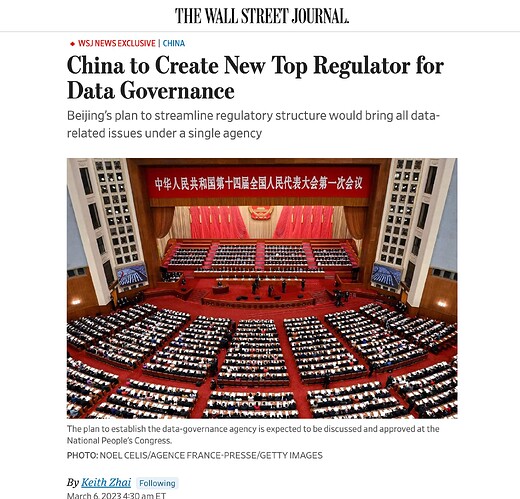-
中国正计划建立一个新的政府机构,集中管理该国庞大的数据存储,以努力解决企业的数据安全问题,并简化其监管结构。该计划将在全国人民代表大会年度会议上讨论和批准。
-
这个新机构将有权监管跨国公司是否可以出口其在中国的业务所产生的数据,并为企业制定和执行数据收集和共享规则。它还可以禁止公司收集某些类型的消费者数据,或审查国内公司计划与外国商业伙伴共享的数据,以检查潜在的国家安全漏洞。
-
这个新机构预计将成为中国在各种数据相关问题上的最高监管机构,取代目前由多个部委共同监督的结构。创建该机构的举措是中国努力改善其数据安全实践和精简其监管结构的一部分。
-
一个新的数据监管机构将调查诸如使用算法操纵数据或诱导未成年人上网成瘾的问题,并确定数据安全的漏洞。
-
该计划将为数据治理带来更精简的方法,建立一个单一的数据相关问题的监管机构。
-
全国人民代表大会和国务院新闻办公室没有对征求意见的请求作出回应。
-
技术高管们担心,新的监管机构是否会扼杀已经受到挫折的技术部门的创新。
-
新的数据监管机构是在对强大的互联网公司进行了为期两年的打击之后成立的。
-
中国的数据监管由多个机构负责,包括中国网络空间管理局、工业和信息化部以及国家发展和改革委员会。这让企业有时感到困惑,不知道该找哪个机构处理合规问题。新机构将拥有与国家反垄断局类似的地位,后者由一名副部级官员领导。
-
世界各地的监管机构一直在处理数字活动所产生的大量数据。欧洲在2018年开始执行一项强有力的隐私法,被称为《一般数据保护条例》。在美国,联邦贸易委员会一直在探索新的法规,以加强在线隐私保护。北京也出台了各种法律和法规,以监督互联网公司持有的数据的处理。
-
国家反垄断局在2021年从一个小部门升格为国家反垄断局,现在更有能力获得各政府机构的资源来审查并购。这符合全球监管趋势,即处理数字活动产生的大量数据,以及消费者对数据隐私的日益关注。
-
中国限制科技公司的数据收集,限制某些数据出境,并要求在海外发送数据时获得监管部门的批准。
-
公司的合规成本增加了,跨国公司在中国建立了数据中心,在当地存储数据。
-
监管机构必须审查大量与海外数据转移有关的安全审查申请,并检查数据做法。
-
技术专家质疑政府官员是否具备审查算法的专业知识。
-
北京已经对互联网公司的数据违规行为进行了打击,并对滴滴出行全球公司违反数据操作规则处以12亿美元的罚款。
-
对滴滴的调查是在其美国首次公开募股后几天展开的。
-
China is planning to create a new government agency to centralize the management of the country’s vast stores of data, in an effort to address data-security practices by businesses and streamline its regulatory structure. The plan is set to be discussed and approved at the National People’s Congress during its annual session.
-
The new agency would have the power to regulate whether multinational companies can export data generated by their operations in China, as well as set and enforce rules for businesses on data-collection and sharing. It could also bar companies from collecting certain kinds of consumer data, or vet data that domestic companies plan to share with foreign business partners to check for potential national-security breaches.
-
The new agency is expected to become the top Chinese regulator on various data-related issues, taking over from the current structure in which multiple ministries share oversight. The move to create this agency is part of China’s efforts to improve its data security practices and streamline its regulatory structure.
-
A new data regulator will investigate issues such as the use of algorithms for data manipulation or inducing internet addiction among minors, and identifying data-security vulnerabilities.
-
The plan would bring a more streamlined approach to data governance, establishing a single go-to regulator on data-related issues.
-
The National People’s Congress and State Council Information Office did not respond to requests for comments.
-
Technology executives are concerned over whether a new regulator would stifle innovation in the already bruised technology sector.
-
The new data regulator comes on the heels of a two-year crackdown on powerful internet companies
-
Data regulation in China is handled by several agencies, including the Cyberspace Administration of China, the Ministry of Industry and Information Technology and the National Development and Reform Commission. This has left businesses confused at times about which body to approach on compliance issues. The new bureau will have a similar status as the State Anti-Monopoly Bureau, which is headed by a deputy-minister-level official.
-
Regulators around the world have been dealing with large volumes of data generated by digital activity. Europe began enforcing a robust privacy law in 2018, known as the General Data Protection Regulation. In the U.S., the Federal Trade Commission has been exploring new regulations to enhance online privacy protections. Beijing has also introduced various laws and regulations to oversee handling of data held by internet companies.
-
The State Anti-Monopoly Bureau was elevated in 2021 from a small department and is now better equipped to access resources across various government agencies to scrutinize mergers and acquisitions. This is in line with the global regulatory trend of dealing with large volumes of data generated by digital activity and increasing consumer concerns around data privacy.
-
China has limited data collection by technology companies, restricted certain data from leaving the country, and required regulatory approval for dispatching data overseas.
-
Compliance costs for companies have increased and multinationals have set up data centers in China to store data locally.
-
Regulators must review a large number of security-review applications related to overseas data transfers and check data practices.
-
Technology experts have questioned whether government officials have the expertise to review algorithms.
-
Beijing has clamped down on internet companies over data breaches and imposed a $1.2 billion fine on Didi Global Inc. for violating rules pertaining to data practices.
-
Investigation of Didi was launched days after its U.S. initial public offering.
链接:China to Create New Top Regulator for Data Governance - WSJ
